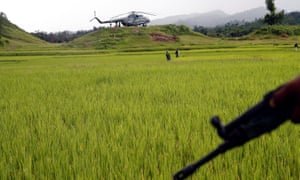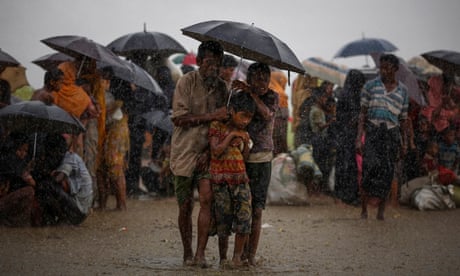Hannah Ellis-Petersen
 The Rohingya military group Arsa carried out deadly massacres and abductions of the Hindu community in Myanmar’s Rakhine state last year, a new report by Amnesty International has revealed. Testimony collected by Amnesty from dozens of witnesses and survivors of the attacks in Rakhine in August have detailed how up to 99 Hindu men, women and children were killed by Arsa militants armed with knives, swords and sticks. Only those who agreed to convert to Islam were spared. According to the report, on 25 August last year, Arsa militants, aided by some local Rohingya, descended on the village of Ah Nauk Kha Maung Seik, in the northern Maungdaw township in Rakhine.
The Rohingya military group Arsa carried out deadly massacres and abductions of the Hindu community in Myanmar’s Rakhine state last year, a new report by Amnesty International has revealed. Testimony collected by Amnesty from dozens of witnesses and survivors of the attacks in Rakhine in August have detailed how up to 99 Hindu men, women and children were killed by Arsa militants armed with knives, swords and sticks. Only those who agreed to convert to Islam were spared. According to the report, on 25 August last year, Arsa militants, aided by some local Rohingya, descended on the village of Ah Nauk Kha Maung Seik, in the northern Maungdaw township in Rakhine.

 The Rohingya military group Arsa carried out deadly massacres and abductions of the Hindu community in Myanmar’s Rakhine state last year, a new report by Amnesty International has revealed. Testimony collected by Amnesty from dozens of witnesses and survivors of the attacks in Rakhine in August have detailed how up to 99 Hindu men, women and children were killed by Arsa militants armed with knives, swords and sticks. Only those who agreed to convert to Islam were spared. According to the report, on 25 August last year, Arsa militants, aided by some local Rohingya, descended on the village of Ah Nauk Kha Maung Seik, in the northern Maungdaw township in Rakhine.
The Rohingya military group Arsa carried out deadly massacres and abductions of the Hindu community in Myanmar’s Rakhine state last year, a new report by Amnesty International has revealed. Testimony collected by Amnesty from dozens of witnesses and survivors of the attacks in Rakhine in August have detailed how up to 99 Hindu men, women and children were killed by Arsa militants armed with knives, swords and sticks. Only those who agreed to convert to Islam were spared. According to the report, on 25 August last year, Arsa militants, aided by some local Rohingya, descended on the village of Ah Nauk Kha Maung Seik, in the northern Maungdaw township in Rakhine.
They rounded up all 69 Hindu men, women, and children, before executing 53 of them. Some who agreed to convert from Hinduism to Islam were freed.
Raj Kumari, 18, who witnessed the attack, told Amnesty: “They slaughtered the men. We were told not to look at them. They had knives. They also had some spades and iron rods. We hid ourselves in the shrubs there and were able to see a little. My uncle, my father, my brother – they were all slaughtered.”
Another witness, Formila, 20, told Amnesty that the Arsa fighters had taken the men away to kill them, then “came back with blood on their swords, and blood on their hands”.
She said: “I saw men holding the heads and hair [of the women] and others were holding knives. And then they cut their throats.”
The report also details other Arsa attacks on 26 August, on the outskirts of Maungdaw town, near Myo Thu Gyi village, where more Hindus and Buddhists were killed.
Arsa – the Arakan Rohingya Salvation army – are a group of trained fighters estimated to be in their hundreds. It was formed in around 2012 in reaction to long-term systematic discrimination against the Rohingya community in Rakhine, but only came to prominence in October 2016 after a series of attacks on Myanmar’s security forces.
The Amnesty report, which has been verified through hundreds of witness accounts, is likely to be controversial because it backs up the assertion by Myanmar’s military and government that their campaign of violence carried out in Rakhine last year was in response to Arsa’s actions.
It was following attacks on the military that the security forces descended on northern Rakhine, attacking, killing and raping Rohingya people in their path. About 700,000 Rohingya fled to Bangladesh where they are now living in camps in Cox’s Bazar.

Amnesty has described the actions of Myanmar’s security services as “crimes against humanity” and the UN has said they bear the “hallmarks of genocide”.
Arsa’s actions have not yet drawn the same international denouncements and calls for accountability.
Rohingya refugees wait for food distribution at refugee camp in Cox’s Bazar, Bangladesh in December. Photograph: Marko Djurica/Reuters
Tirana Hassan, crisis response director at Amnesty International, said it was important to stress that justice was needed for those who suffered at the hands of the Myanmar military and Arsa. “Both must be condemned – human rights violations or abuses by one side never justify abuses or violations by the other,” Hassan said.
“It’s hard to ignore the sheer brutality of Arsa’s actions, which have left an indelible impression on the survivors we’ve spoken to. Accountability for these atrocities is every bit as crucial as it is for the crimes against humanity carried out by Myanmar’s security forces in northern Rakhine state.”
It has taken months for the full account to come out mainly because of lack of access to northern Rakhine state. The accounts by witnesses also reveal the level of fear that victims had about telling the truth, and that eight Hindu women who fled to refugee camps in Bangladesh were pressured by Arsa to make videos claiming the Myanmar military carried out the violence against them.
Since the Rohingya were forced to flee from northern Rakhine, Arsa’s presence has mainly been online, though the group has been quiet on social media since January. It is not known whether it has plans to mobilise again.
Laura Haigh, an Amnesty researcher who helped compile the report, said it had been “very difficult to get people to open up about Arsa, they are a very elusive group, and there is a fear among the community now in Bangladesh, with the informant killings last year, not to speak out and that there could be reprisals against those who do.”
She added: “There is some concern among people that shedding light on the abuses means in some way that the actions of the military were justified, that it will undermine the need for accountability for the crimes against humanity, which it absolutely does not. This is just another aspect of what happened in August that needs to be investigated.”
The Myanmar government did not respond to request for comment.
Since you’re here …
No comments:
Post a Comment